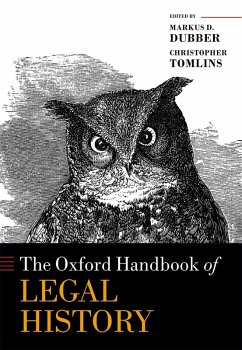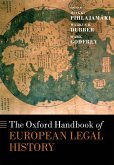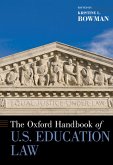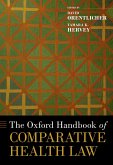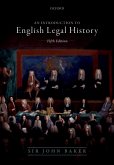The Oxford Handbook of Legal History (eBook, ePUB)
Redaktion: Dubber, Markus D.; Tomlins, Christopher


Alle Infos zum eBook verschenken

The Oxford Handbook of Legal History (eBook, ePUB)
Redaktion: Dubber, Markus D.; Tomlins, Christopher
- Format: ePub
- Merkliste
- Auf die Merkliste
- Bewerten Bewerten
- Teilen
- Produkt teilen
- Produkterinnerung
- Produkterinnerung

Hier können Sie sich einloggen

Bitte loggen Sie sich zunächst in Ihr Kundenkonto ein oder registrieren Sie sich bei bücher.de, um das eBook-Abo tolino select nutzen zu können.
Some of the most exciting and innovative legal scholarship has been driven by historical curiosity. Legal history today comes in a fascinating array of shapes and sizes, from microhistory to global intellectual history. Legal history has expanded beyond traditional parochial boundaries to become increasingly international and comparative in scope and orientation. Drawing on scholarship from around the world, and representing a variety of methodological approaches, areas of expertise, and research agendas, this timely compendium takes stock of legal history and methodology and reflects on the…mehr
- Geräte: eReader
- mit Kopierschutz
- eBook Hilfe
- Größe: 3.44MB
![The Oxford Handbook of European Legal History (eBook, ePUB) The Oxford Handbook of European Legal History (eBook, ePUB)]() The Oxford Handbook of European Legal History (eBook, ePUB)98,95 €
The Oxford Handbook of European Legal History (eBook, ePUB)98,95 €![The Oxford Handbook of Comparative Law (eBook, ePUB) The Oxford Handbook of Comparative Law (eBook, ePUB)]() The Oxford Handbook of Comparative Law (eBook, ePUB)126,95 €
The Oxford Handbook of Comparative Law (eBook, ePUB)126,95 €![The Oxford Handbook of U.S. Education Law (eBook, ePUB) The Oxford Handbook of U.S. Education Law (eBook, ePUB)]() The Oxford Handbook of U.S. Education Law (eBook, ePUB)102,95 €
The Oxford Handbook of U.S. Education Law (eBook, ePUB)102,95 €![The Oxford Handbook of Comparative Health Law (eBook, ePUB) The Oxford Handbook of Comparative Health Law (eBook, ePUB)]() The Oxford Handbook of Comparative Health Law (eBook, ePUB)102,95 €
The Oxford Handbook of Comparative Health Law (eBook, ePUB)102,95 €![The Oxford Handbook of the New Private Law (eBook, ePUB) The Oxford Handbook of the New Private Law (eBook, ePUB)]() The Oxford Handbook of the New Private Law (eBook, ePUB)90,95 €
The Oxford Handbook of the New Private Law (eBook, ePUB)90,95 €![Introduction to English Legal History (eBook, ePUB) Introduction to English Legal History (eBook, ePUB)]() John BakerIntroduction to English Legal History (eBook, ePUB)43,95 €
John BakerIntroduction to English Legal History (eBook, ePUB)43,95 €![The Oxford Handbook of Global Legal Pluralism (eBook, ePUB) The Oxford Handbook of Global Legal Pluralism (eBook, ePUB)]() The Oxford Handbook of Global Legal Pluralism (eBook, ePUB)102,95 €
The Oxford Handbook of Global Legal Pluralism (eBook, ePUB)102,95 €-
-
-
Dieser Download kann aus rechtlichen Gründen nur mit Rechnungsadresse in A, B, BG, CY, CZ, D, DK, EW, E, FIN, F, GR, HR, H, IRL, I, LT, L, LR, M, NL, PL, P, R, S, SLO, SK ausgeliefert werden.
- Produktdetails
- Verlag: Oxford University Press
- Seitenzahl: 1152
- Erscheinungstermin: 26. Juli 2018
- Englisch
- ISBN-13: 9780192513144
- Artikelnr.: 53478036
- Verlag: Oxford University Press
- Seitenzahl: 1152
- Erscheinungstermin: 26. Juli 2018
- Englisch
- ISBN-13: 9780192513144
- Artikelnr.: 53478036
* Part I Contexts: Locating Legal History
* 1: Maks Del Mar: Philosophical Analysis and Historical Inquiry:
Theorising Normativity, Law and Legal Thought
* 2: Ron Harris: The History and Historical Stance of Law and Economics
* 3: Günter Frankenberg: Critical Histories of Comparative Law
* 4: Simon Stern: Literary Analysis of Law
* 5: Marianne Constable and Samera Esmeir: Rhetoric and the
Possibilities of Legal History
* Part II Approaches: Conceptualizing Legal History
* 6: Markus Dubber: Legal History as Legal Scholarship: Doctrinalism,
Interdisciplinarity, and Critical Analysis of Law
* 7: Laura F. Edwards: Law as Social History
* 8: Roy Kreitner: Legal History as Political History
* 9: Assaf Likhovski: The Intellectual History of Law
* 10: Joshua Getzler: Legal History as Doctrinal History
* 11: Bryan Wagner: Historical Method in the Study of Law and Culture
* 12: Anne Fleming: Legal History as Economic History
* 13: Carolyn Strange: Femininities and Masculinities: Looking Backward
and Moving Forward in Criminal Legal Historical Gender Research
* 14: Angela Fernandez: Legal history as the History of Legal Texts
* 15: Katharina Isabel Schmidt: From Evolutionary Functionalism to
Critical Transnationalism: Comparative Legal History, Aristotle to
Present
* 16: Renisa Mawani: Archival Legal History: Toward the Ocean as
Archive
* 17: Elizabeth Dale: Spelunking, or, Some Meditations on the New
Presentism
* 18: Paul D. Halliday: Legal History: Taking the Long View
* 19: Daniel Klerman: Quantitative Legal History
* PART III Perspectives: Legal History in Modern Legal Thought
* 20: John V. Orth: Blackstone
* 21: Philip Schofield: Jeremy Bentham
* 22: Mathias Reimann: Historical Jurisprudence
* 23: Michael Lobban: Legal Formalism
* 24: Noga Morag-Levine: Sociological Jurisprudence and the Spirit of
the Common Law
* 25: Dan Priel: The Return of Legal Realism
* 26: Catherine L. Fisk: and: Law _ Society in Historical Legal
Research
* 27: Tom Johnson: Legal History and the Material Turn
* 28: Christopher Tomlins: Marxist Legal History
* 29: Justin Desautels-Stein: Structuralist and Poststructuralist Legal
History
* 30: John Henry Schlegel: Sez Who? Critical Legal History without a
Privileged Position
* 31: Emilios Christodoulidis and Johan van der Walt: Critical Legal
Studies: Europe
* 32: Maria Drakopoulou: Feminist Historiography of Law: An Exposition
and Proposition
* 33: H. Timothy Lovelace, Jr.: Critical Race Theory and the Political
Uses of Legal History
* 34: David Minto: Queering Law's Empire: Domination and Domain in the
Sexing Up of Legal History
* PART IV Traditions: Tracing Legal History
* 35: Clifford Ando: Roman Law
* 36: Karl Shoemaker: Medieval Canon Law
* 37: Kunal M. Parker: The Transformation of the Common Law: Modernism,
History, and the Turn to Process
* 38: Heikki Pihlajamäki: Tracing Legal History in Continental Civil
Law
* 39: Steven Wilf: Jewish Law
* 40: Lena Salaymeh: Historical Research on Islamic Law
* 41: Tahirih V. Lee: 'By the Light of the Moon': Looking for China's
Rich Legal Tradition
* 42: Shaunnagh Dorsett: Aboriginal and Indigenous Law in Australia and
New Zealand)
* 43: Thomas Duve: Indigenous Rights in Latin America
* 44: Mitra Sharafi: Indian Law
* 45: Doreen Lustig: Governance Histories of International Law
* 46: Paul McHugh: Imperial law: the Legal Historian and the Trials and
Tribulations of an Imperial Past
* PART V Illustrations: Doing Things with Legal History
* 47: Gerry Leonard: A History of Violence: American Constitutional
History and the Criminal System
* 48: Alfred L. Brophy: Historical Analysis in Property Law
* 49: Anat Rosenberg: What Do Contracts Histories Tell Us About
Capitalism: From Origins and Distribution, to the Body and the Nation
* 50: Arlie Loughnan: Historical Analysis in Criminal Law: a
Counter-History of Criminal Trial Verdicts
* 51: Martin Loughlin: The Historical Method in Public Law
* 52: David Schorr: Historical Analysis in Environmental Law
* 53: Norman W. Spaulding: Redeeming the American Founding?
* 54: Peter Lindseth: Foundings: Europe
* 55: R.P. Boast: Adjudication of Indigenous-Settler Relations
* 56: Leora Bilsky and Rachel Klagsbrun: Cultural Genocide: between Law
and History
* 57: Sam Erman and Nathan Perl-Rosenthal: Historians' Amicus Briefs:
Practice and Prospect
* Part I Contexts: Locating Legal History
* 1: Maks Del Mar: Philosophical Analysis and Historical Inquiry:
Theorising Normativity, Law and Legal Thought
* 2: Ron Harris: The History and Historical Stance of Law and Economics
* 3: Günter Frankenberg: Critical Histories of Comparative Law
* 4: Simon Stern: Literary Analysis of Law
* 5: Marianne Constable and Samera Esmeir: Rhetoric and the
Possibilities of Legal History
* Part II Approaches: Conceptualizing Legal History
* 6: Markus Dubber: Legal History as Legal Scholarship: Doctrinalism,
Interdisciplinarity, and Critical Analysis of Law
* 7: Laura F. Edwards: Law as Social History
* 8: Roy Kreitner: Legal History as Political History
* 9: Assaf Likhovski: The Intellectual History of Law
* 10: Joshua Getzler: Legal History as Doctrinal History
* 11: Bryan Wagner: Historical Method in the Study of Law and Culture
* 12: Anne Fleming: Legal History as Economic History
* 13: Carolyn Strange: Femininities and Masculinities: Looking Backward
and Moving Forward in Criminal Legal Historical Gender Research
* 14: Angela Fernandez: Legal history as the History of Legal Texts
* 15: Katharina Isabel Schmidt: From Evolutionary Functionalism to
Critical Transnationalism: Comparative Legal History, Aristotle to
Present
* 16: Renisa Mawani: Archival Legal History: Toward the Ocean as
Archive
* 17: Elizabeth Dale: Spelunking, or, Some Meditations on the New
Presentism
* 18: Paul D. Halliday: Legal History: Taking the Long View
* 19: Daniel Klerman: Quantitative Legal History
* PART III Perspectives: Legal History in Modern Legal Thought
* 20: John V. Orth: Blackstone
* 21: Philip Schofield: Jeremy Bentham
* 22: Mathias Reimann: Historical Jurisprudence
* 23: Michael Lobban: Legal Formalism
* 24: Noga Morag-Levine: Sociological Jurisprudence and the Spirit of
the Common Law
* 25: Dan Priel: The Return of Legal Realism
* 26: Catherine L. Fisk: and: Law _ Society in Historical Legal
Research
* 27: Tom Johnson: Legal History and the Material Turn
* 28: Christopher Tomlins: Marxist Legal History
* 29: Justin Desautels-Stein: Structuralist and Poststructuralist Legal
History
* 30: John Henry Schlegel: Sez Who? Critical Legal History without a
Privileged Position
* 31: Emilios Christodoulidis and Johan van der Walt: Critical Legal
Studies: Europe
* 32: Maria Drakopoulou: Feminist Historiography of Law: An Exposition
and Proposition
* 33: H. Timothy Lovelace, Jr.: Critical Race Theory and the Political
Uses of Legal History
* 34: David Minto: Queering Law's Empire: Domination and Domain in the
Sexing Up of Legal History
* PART IV Traditions: Tracing Legal History
* 35: Clifford Ando: Roman Law
* 36: Karl Shoemaker: Medieval Canon Law
* 37: Kunal M. Parker: The Transformation of the Common Law: Modernism,
History, and the Turn to Process
* 38: Heikki Pihlajamäki: Tracing Legal History in Continental Civil
Law
* 39: Steven Wilf: Jewish Law
* 40: Lena Salaymeh: Historical Research on Islamic Law
* 41: Tahirih V. Lee: 'By the Light of the Moon': Looking for China's
Rich Legal Tradition
* 42: Shaunnagh Dorsett: Aboriginal and Indigenous Law in Australia and
New Zealand)
* 43: Thomas Duve: Indigenous Rights in Latin America
* 44: Mitra Sharafi: Indian Law
* 45: Doreen Lustig: Governance Histories of International Law
* 46: Paul McHugh: Imperial law: the Legal Historian and the Trials and
Tribulations of an Imperial Past
* PART V Illustrations: Doing Things with Legal History
* 47: Gerry Leonard: A History of Violence: American Constitutional
History and the Criminal System
* 48: Alfred L. Brophy: Historical Analysis in Property Law
* 49: Anat Rosenberg: What Do Contracts Histories Tell Us About
Capitalism: From Origins and Distribution, to the Body and the Nation
* 50: Arlie Loughnan: Historical Analysis in Criminal Law: a
Counter-History of Criminal Trial Verdicts
* 51: Martin Loughlin: The Historical Method in Public Law
* 52: David Schorr: Historical Analysis in Environmental Law
* 53: Norman W. Spaulding: Redeeming the American Founding?
* 54: Peter Lindseth: Foundings: Europe
* 55: R.P. Boast: Adjudication of Indigenous-Settler Relations
* 56: Leora Bilsky and Rachel Klagsbrun: Cultural Genocide: between Law
and History
* 57: Sam Erman and Nathan Perl-Rosenthal: Historians' Amicus Briefs:
Practice and Prospect
